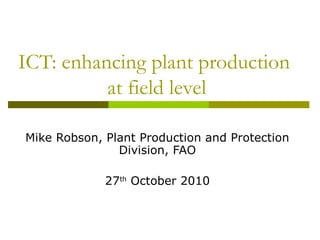
ICT-Enhancing Plant Production at Field Level
- 1. ICT: enhancing plant production at field level Mike Robson, Plant Production and Protection Division, FAO 27th October 2010
- 2. FAO’s strategic objective A: Sustainable Crop Production Intensification ICT in plant production offers considerable potential to support sustainable intensification farmers have a major need for technical knowledge – new technologies for production intensification are “knowledge-intensive”... this knowledge is not always “hi-tech” extensionists (and others) need local knowledge to help farmers overcome production constraints, avoid unnecessary use of resources, etc Introduction
- 3. technical knowledge transfer provision of technical knowledge to farmers in the form of agricultural extension has a long history, but: extension has experienced a long period of funding decline... new paradigms are emerging in extension, going beyond technology transfer to considering the broader context (eg farm incomes and livelihoods) [Swanson et al, WB, 2010] farmers now have access to many more sources of information than previously (input supply dealers, privatised extension services, farmers’ or commodity associations, etc), via mobile phone or other ICTs challenges remain of how to: ensure that knowledge meets real (actual + latent) demand? identify where techniques are adopted, or adapted, locally? encourage further sharing to achieve impact at scale? “one-way” knowledge transfer is unlikely to have much benefit, unless re-inforced in local communities and institutions
- 4. local knowledge-gathering related to sustainable intensification Is the field problem observable -> need for expertise in identification, sampling, data management, analysis (what data) Motivation, involvement (why is it needed) Infrastructure (how will it be collected/shared) Resources (who collects) Use (who benefits and how)
- 5. four examples from plant protection 1. Locust surveillance (Mauritania to India) 2. Monitoring multiplication sites for cassava disease (Central Africa) 3. Roving crop pest surveys (India) 4. Large scale pest reporting (Uganda/Tanzania)
- 6. problem: how to survey rapidly changing Desert Locust upsurges in remote areas, to plan locust control campaigns? 1. e-Locust2:
- 7. KNOWLEDGE AT WORK: Nomads, travelers and farmers see signs of locust activity KNOWLEDGE AT WORK: Survey teams record field observations and communicate locust activity KNOWLEDGE AT WORK: Based on LocustWatch, action is taken to address the situation KNOWLEDGE AT WORK: FAO analyses information from all countries and other sources to assess current situation and publish forecasts KNOWLEDGE AT WORK: National Locus Centres enter field data in information system for assessment INFORMATION FLOW INFORMATION FLOW PUBLICATIONS: In various formats and media GLOBAL INFORMATION NETWORK: Face-to-face interactions and Information/communication technologies to help connect people and share information SUPPORTING INFORMATION FLOW AND THE DESERT LOCUST KNOWLEDGE NETWORK INFORMATION FLOW INFORMATION FLOW INFORMATION FLOW INFORMATION FLOW KNOWLEDGE AT WORK: Partner organizations (universities and private sector) work with FAO to continually improve analytical tools INFORMATION FLOW
- 8. 2. Cassava multiplication (C. Africa) problem: how to monitor CBSD infection in cassava multiplication sites, and reduce risk of distributing infected material
- 9. effective communication to a national programme task force using Digital Pen Technology
- 11. problem: how to get State IPM officials to gather good quality geo-referenced pest data for key crops (cotton rice, groundnut, pulses)? [PDA] 3. Roving pest surveillance (India)
- 12. 4. Pilot large scale pest reporting Field worker Sub-county extension (DVO, DAO, NAADS Coordinators) District Production Office (DVO, DAO, NAADS) System monitor warnings verified Research (NARO, universities) Field workers in surrounding areas confirmed data Donors (Project funding) problem: how to gather early indications of pest problems, capturing mobile voice calls more systematically? [SMS Gateway] SMS Gateway
- 13. lessons learnt local knowledge gathering initiatives should be subjected to rigorous testing, for instance of: who will benefit from local knowledge gathering what is to be collected where will the benefit come from how will collection be organised (and who will collect it)
- 14. lessons learnt (2) 1. generally, the ICTs work (!) - but sometimes they don’t survive field testing... ...“even ruggedised laptops don’t like sand” ...“the screen was too small for the survey form”, etc 2. some technologies which do work can be unexpectedly unfamiliar and/or inappropriate (SMS/text in an oral culture) 3. approaches are unpopular if they are purely “extractive” – i.e. aim to aggregate data for national or regional purposes without bringing any local user benefit 4. there is a wide range of interested parties (eg agricultural research, the private sector, phone providers...) 5. many projects remain technology-driven, and donor-driven
- 15. concluding thoughts the potential for ICT to support sustainable crop production intensification is real, for both technical empowerment and local knowledge gathering the key is problem definition...and local ownership to move beyond projects and pilots there needs to be a workable business model, including private sector involvement we have learnt a number of important lessons, and want to share and build on these to improve ICT support for sustainable intensification
- 16. THANK YOU
